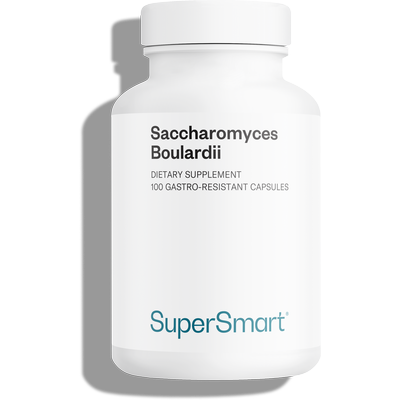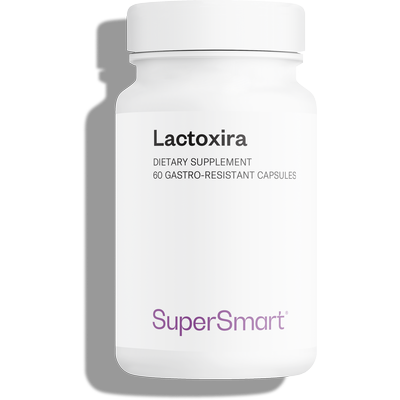Reducing anxiety by regulating gut flora: 21 studies provide confirmation

Regulating intestinal bacteria helps improve an individual’s stress status: that’s the conclusion reached recently by researchers from Shanghai University (1) following detailed examination of 21 scientific studies.
How are intestinal microbiota and anxiety linked?
Anxiety is one of the most common symptoms of mental disease. A number of studies are now reporting a significant association between intestinal microbiota and anxiety. So what exactly is our intestinal microbiota? Also referred to as gut flora, it’s the collection of microorganisms found at any given moment in the gut – the small intestine and large intestine (colon). Our microbiota is in constant flux due to the life-cycle of these microorganisms and the food we consume which regularly introduces new elements into this already-unstable milieu.
Disruption to gut flora is known to have an adverse effect on mental state via the ‘gut-brain’ axis. The gut is actually composed of millions of neurons, and as a result, sends information directly to the brain via the production of neurotransmitters. The Shanghai University team therefore conducted a systematic review of 21 relevant studies to try and find out more about the potential effects of regulating the microbiota. These studies explore in depth the effects on anxiety of ingesting probiotics (such as the psychobiotic Lactoxira), either in supplement form or by eating a diet high in naturally-present probiotics.
The researchers’ findings were clear: regulating gut flora by means of an appropriate diet, accompanied by a probiotic supplement, offers positive effects in reducing anxiety.
What role do probiotics play in the body?
Probiotics are microorganisms which are present in their native state in all of us from birth: they’re in the gut, the genital tract, the mouth and on the skin … They’re often referred to as ‘good’ bacteria, because they help fight ‘bad’ bacteria, preventing unwelcome microbes from becoming established in the body, especially in the gut.
They’re known to be effective at regulating stress and mood problems in general. Alongside the clear role they play in promoting normal digestion - by preventing bloating, constipation and diarrhoea, they are also effective against other disorders such as irritable bowel syndrome, helicobacter pylori infection (often the cause of gastric or duodenal ulcers and a risk factor for gastric cancer), recurrent ulcerative colitis or pouchitis, as well as vaginal infections.
What are probiotics’ modes of action?
Probiotics work in three main ways:
- Improvement of the intestinal immune system: they help ‘beef up’ weak immunity, seen particularly in young children and the elderly. They also regulate an occasionally over-active immune system – as in the case of an allergic reaction, for example, or the intestinal inflammation associated with inflammatory diseases like Crohn’s or haemorrhagic colitis;
- Support for the intestinal mucosa: the intestinal wall is covered with a mucous membrane which produces antibodies or protective mucus. Probiotics promote these protective effects and play an essential role in balancing exchanges between the intestines and the rest of the body;
- An anti-microbial effect: probiotics take the place of pathogenic microorganisms through a competitive process, so when ‘good’, rather than pathogenic, bacteria are delivered to the dominant gut flora, it makes it even harder for the ‘bad’ bacteria to proliferate.
Probiotics in the diet
A balanced diet, particularly a high-fibre one, will regulate intestinal flora naturally. A diet rich in natural probiotics increases this regulatory effect.
Probiotics are particularly found in fermented foods:
- yogurt, naturally rich in lactic ferments – and even better if the packaging indicates it contains these particular ferments: Lactobacillus bulgaricus, Streptococcus thermophilus, Lactobacillus acidophilus, or Lactobacillus casei;
- other fermented dairy products such as cheese, to a lesser degree. Such foods are high in lactobacillus, bifidobacteria and certain streptococcus;
- miso, tempeh and sauerkraut, as well as all lacto-fermented foods in general.
Probiotic supplements
Probiotics are also available in powder or capsule form, which boost the effects of a balanced diet by delivering a large quantity of directly-usable microorganisms to the body. Such products generally offer a combination of the most effective and appropriate probiotics, the most common being lactic bacteria and brewer’s yeast (saccharomyces cerevisiae).
The advantage of dietary supplements is the way they’re delivered as long as you choose gastro-resistant capsules. Since some probiotics are destroyed by stomach acids, an appropriate dosage form such as a capsule will ensure the probiotics reach the gut intact. What’s more, certain supplements are enriched with compounds (such as rice bran or acacia fibre) which improve absorption and digestibility.
Note: probiotics pass through the gut so it’s essential to take them regularly in order to maintain their effects. They have proven their worth as essential elements for health. They have the advantage of being safe, though it’s always advisable to seek medical advice before taking supplements for therapeutic purposes. They will be even more effective if combined with a balanced diet: it’s the perfect combination for maintaining gut flora equilibrium and good mental health.
Reference
(1) Yang B, Wei J, Ju P, et al. Effects of regulating intestinal microbiota on anxiety symptoms: A systematic review. General Psychiatry. Vol. 32, 2019.

Standardised 2 x 1010 CFU/g. Probiotic used for decades for treating diarrhoea
www.supersmart.comAll rights reserved
Free
Thank you for visiting our site. Before you go
REGISTER WITHClub SuperSmart
of exclusive benefits:
- Free: our weekly science-based newsletter "Nutranews"
- Special offers for club members only



















